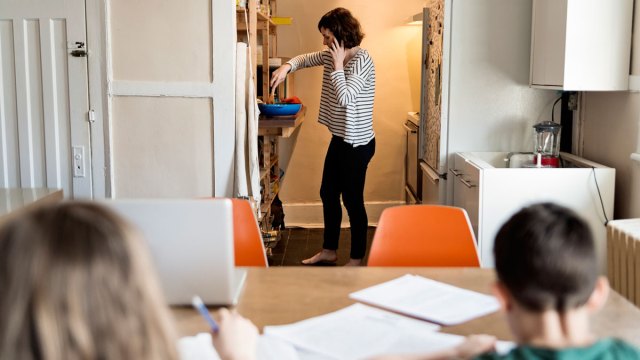It started on Parents’ Night, those evenings in elementary school when my husband and I crammed ourselves into tiny chairs and feigned interest while each teacher made their way through a PowerPoint presentation about the topics they’d cover, the assignments they’d be giving, and—our favorite—the “rubric.” That was our code word for all the things we didn’t need to know about our kids’ education.
None of the other parents looked as dismayed—or as bored—as we did, and I briefly wondered what was wrong with us before deciding that, no, we were right: It was a pointless evening. “Next time, skip it and go out to dinner,” was my father’s advice. I wanted to, but just imagining the other parents glaring at our empty chairs guilted me into returning, year after year. But back at home, my husband and I broke from the pack in another way: We decided we simply wouldn’t be getting involved with our kids’ homework from that point on.
The chatter in my local Facebook groups tells me that all the other parents know a hell of a lot more about their kids’ assignments than I do—test dates, reading lists, project details. Why do you know all this? I’ve always wondered as I scrolled. Don’t you have enough to do just raising them and keeping everyone in the household relatively sane?
In our town of privilege, where parents get (overly) involved in every aspect of their kids’ day-to-day schoolwork, we are the outliers: We believe our kids have more to learn by managing it themselves than by being prodded, reminded, and cajoled into getting their work done and as close to perfect as possible before the teacher sees it.
For one, my kids, who are now teens, learned—really learned—about consequences. When they didn’t do their homework, their grades went down. If a teacher raised the red flag to us, we took that back to the kids and told them to step it up. We did not, however, change our tactics and become the homework police, and we didn’t punish them, because the bad grades are the punishment.
Plus, if kids get answers wrong, isn’t that useful information for the teacher? If all parents are making sure homework is perfect before it goes back to school, the teacher won’t know if there’s something happening in class that the students don’t understand.
Not to mention, do we really need to make everything in their lives even more stressful by becoming homework enforcers? Can’t we have a few peaceful minutes with our kids where we’re not telling them what to do? Please?
For the record, I’m not suggesting that you stay out of your kids’ homework; I’m not that invested in other people’s choices. And I readily admit that there are circumstances where more direction is needed—for instance, if a child has a learning disability or ADHD, or faces other, similar challenges.
But for us, putting the kids’ homework on our to-do lists never made sense. And because we didn’t get involved, our kids saw the direct connection between their choice to do their work and their grades, as well as the way the opportunities (special activities, cool programs) that came—or didn’t come—their way as a result. And let’s be honest, elementary school is the time to learn this since grades at that stage don’t matter very much. (There, I said it.)
Related: I Don’t Always Know Where My Kids Are—and I’m Great with That
Have we been through our ups and downs with all this? Absolutely! But we’ve also seen the lesson take hold with both our kids. We’d been hearing the same story from all of my daughter’s middle school teachers: She doesn’t do the homework, she has so much potential, she needs to apply herself more. We’d come home with the teachers’ reports, make suggestions for how best to manage the workload, and then leave it to her.
Suddenly, when high school started, she started to care. She took pride in doing assignments well and learned the joy of life without the constant dread of being caught with her academic pants down. She wanted to do well and felt proud of herself when she did so, eager to remedy things when she didn’t. Even more, she discovered she’d established a level of trust with her teachers, so when something fell through the cracks, they knew it was an aberration instead of a habit and gave her some leeway. When she acted more like a responsible person, she was treated like one. Huzzah!
It’s not that we don’t care; we care deeply. But seeing as we both graduated from school long ago, we didn’t feel the need to dive in and do it all over again. We’re here when our kids need us, but until then, we let them steer the ship on their own.
